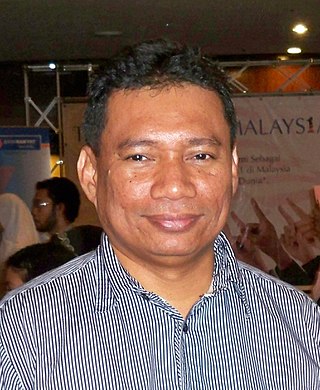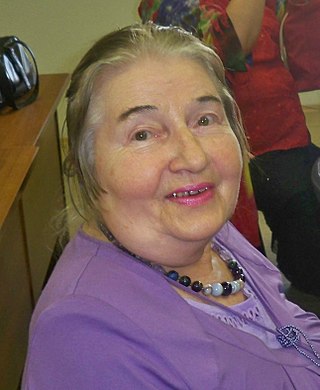
Malay is an Austronesian language that is an official language of Brunei, Indonesia, Malaysia, and Singapore, and that is also spoken in East Timor and parts of the Philippines and Thailand. Altogether, it is spoken by 290 million people across Maritime Southeast Asia.

Dewan Bahasa dan Pustaka, abbreviated DBP, is the government body responsible for coordinating the use of the Malay language and Malay-language literature in Malaysia.
Syed Muhammad al Naquib bin Ali al-Attas is a Malaysian Muslim philosopher. He is one of the few contemporary scholars who is thoroughly rooted in the traditional Islamic sciences and studies theology, philosophy, metaphysics, history, and literature. He pioneered the concept of Islamisation of knowledge. Al-Attas' philosophy and methodology of education have one goal: Islamisation of the mind, body and soul and its effects on the personal and collective life on Muslims as well as others, including the spiritual and physical non-human environment.
Indonesian and Standard Malay are two standardised varieties of the Malay language, used officially in Indonesia on one hand and in Brunei, Malaysia and Singapore on the other. Both varieties are generally mutually intelligible, yet there are noticeable differences in spelling, grammar, pronunciation and vocabulary, as well as the predominant source of loanwords. The differences can range from those mutually unintelligible with one another, to those having a closer familial resemblance. The regionalised and localised varieties of Malay can become a catalyst for intercultural conflict, especially in higher education.

The Kedayan are an ethnic group residing in Brunei, Federal Territory of Labuan, southwest of Sabah, and north of Sarawak on the island of Borneo. According to the Language and Literature Bureau of Brunei, the Kedayan language is spoken by about 30,000 people in Brunei, and it has been claimed that there are a further 46,500 speakers in Sabah and 37,000 in Sarawak. In Sabah the Kedayan mainly live in the cities of Sipitang, Beaufort, Kuala Penyu and Papar. In Sarawak the Kedayans mostly reside in Lawas, Limbang, Miri and the Subis area. The Kedayan people are also regarded as a sub-ethnic group of the Klemantan Dayak people.
Keris Mas, born Kamaluddin Muhamad, was a prominent Malaysian literary figure and was one of the founders of the Asas '50 literary movement. His numerous contributions to Malay language literature led him to become Malaysia's first National Laureate in 1981.

Greater Indonesia was a political concept that sought to bring the so-called Malay race together by uniting the territories of Dutch East Indies with the British Malaya and British Borneo. It was espoused by students and graduates of Sultan Idris Training College for Malay Teachers in the late 1920s, and individuals from Sumatra and Java including Mohammad Natsir and Sukarno on September 28, 1950. Indonesia Raya was adapted as the name of what later became the Indonesian national anthem in 1924. While the definition of Greater Indonesia is consistent, the definition of Greater Malay and related concept of Malay world and realm are varied from the synonym of Greater Indonesia to Peninsular-focused dominance.

Tan Sri Dato' Seri Utama Dr. Rais bin Yatim is a Malaysian politician who is now serving as the 18th President of the Dewan Negara since September 2020. He was a Cabinet Minister in multiple federal governments from 1974 to 2013 and the 8th Menteri Besar of Negeri Sembilan from 1978 to 1982. He was the Member of Parliament (MP) for Jelebu from November 1999 to May 2013.
Sarawak Malay is a Malayic language native to the State of Sarawak. It is a common language used by natives of Sarawak. This variant is related to Bruneian Malay, spoken in the districts of Limbang and Lawas (Sarawak) and bears strong similarities with Sanggau, Sintang and Sekadau Malay spoken in the northern part of the West Kalimantan province in Indonesia. There is some debate on whether it is a vernacular variety of Malay or a separate language altogether. It is more similar to Ibanic languages compared to the Malay dialects of Sumatra and the Malayan Peninsula, and is different enough from standard Malay that speakers outside of Sarawak are often unable to understand it without prior study..
The Ibanic languages are a branch of the Malayic languages indigenous to western Borneo. They are spoken by the Ibans and related groups in East Malaysia and the Indonesian province of West Kalimantan. Other Dayak languages, called Land Dayak, which are not Ibanic, are found in the northwest corner of Kalimantan, between Ibanic and non-Ibanic Malayic languages such as Kendayan and the Malay dialects of Sarawak and Pontianak.

Wan Osman Wan Awang, also known by his pen name Usman Awang was a Malaysian poet, playwright, novelist and Malaysian National Laureate (1983).
The Tutong language, also known as Basa Tutong, is a language spoken by approximately 17,000 people in Brunei. It is the main language of the Tutong people, the majority ethnic group in the Tutong District of Brunei.
This article explains the phonology of Malay and Indonesian based on the pronunciation of Standard Malay, which is the official language of Brunei, Singapore and Malaysia and Indonesian which is the official language of Indonesia and a working language in Timor Leste. Bruneian Standard Malay and Malaysian Standard Malay follow the Johor-Riau Pronunciation, while Singaporean Standard Malay and Indonesian follow the Baku Pronunciation.

Syed Mohd Zakir Bin Syed, is a Malaysian writer of prose, poetry, and theatrical texts.
Harry Aveling is an Australian scholar, translator and teacher. He specialises in Indonesian and Malaysian literature, and Translation Studies. He received the degrees of Doctor of Philosophy in Malay Studies from the National University of Singapore and Doctor of Creative Arts (DCA) from the University of Technology, Sydney. Besides his academic writing, he has translated extensively from Indonesian and Malay, from Vietnamese Francophone literature, and also co-translated from Hindi. He has been awarded the Anugerah Pengembangan Sastra for his translation work. Aveling has two sons, a daughter and five granddaughters.

Siti Zainon Ismail is a Malaysian novelist, short story writer, poet, and academic. She is best known for her multi-genre novel, Pulau Renik Ungu.
Perak Malay is one of the Malay dialects spoken within the state of Perak, Malaysia. Although it is neither the official language nor the standard dialect in the whole state of Perak, its existence which co-exists with other major dialects in the state of Perak still plays an important role in maintaining the identity of Perak. In spite of the fact that there are five main dialects traditionally spoken in Perak, only one of which is intended by the name "Perak Malay". There are subtle phonetic, syntactic and lexical distinctions from other major Malay dialects. Perak Malay can be divided into two sub-dialects, Kuala Kangsar and Perak Tengah, named after the daerah (districts) where they are predominantly spoken.

Natalia Fyodorovna Alieva - Soviet and Russian orientalist, the noted specialist in Austronesian languages and, in particular, in the Indonesian language, Principal Researcher at Institute of Oriental Studies of the Russian Academy of Sciences.

Zakaria Ariffin is a Malaysian playwright, theater director and educator.
Dr. Mohamed Ghazali bin Abdul Rashid or better known by his pen name Malim Ghozali PK was a Malaysian writer and laureate from Perak. He was crowned as the Sasterawan Perak in 2014. He authored a variety of literary works such as Novels and short stories. He also received numerous awards including the Southeast Asian Writers Award in 2013.










